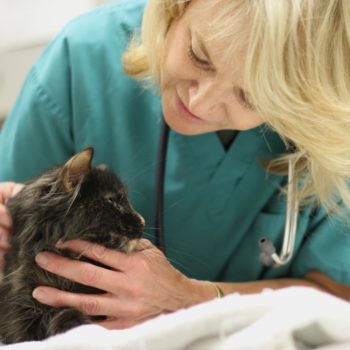When you think of a veterinarian working in an animal shelter, what do you imagine they do there? For many shelter managers who participated in a recent study, that answer is “perform spay/neuter surgery.” However, shelter veterinarians and shelter medicine can play a much larger role in an animal shelter, providing expertise on disease prevention and the medical and behavioral health of animals.
In a 2016 study published in The Veterinary Journal, researchers distributed an electronic survey to 1,373 managers of animal shelters in North America, to which they received 536 responses. The survey examined the relationship and perception of veterinarians on the part of the managers, with the overall findings suggesting that the respondent shelters both valued the contribution of veterinarians to their organization, and wanted to expand that contribution, particularly by increasing the number of veterinarians actually working as part of the shelter team.
Because shelter medicine is a new specialty and has been growing vigorously in recent years, this is not necessarily surprising, and is definitely heartening. But other findings weren’t so encouraging. Consider the following facts obtained through the survey:
- Every shelter that responded reported a problem in their facility with at least one infectious disease, ranging from parvo to ringworm
- Almost 77 percent of respondents said common shelter infectious diseases had a substantial negative effect on the shelter’s success
- 86.4 percent said these diseases negatively impacted the shelter’s finances
Nonetheless, when asked what was most important about working with a veterinarian, 92.9 percent of the shelter managers said the most important task they performed was spay/neuter. In second place was the diagnosis and treatment of animals, followed by providing authorization for purchase and administration of drugs.
The study authors reported that “the task given lowest priority was providing expertise on animal behavior…. Respondents rated themselves as significantly more knowledgeable than veterinarians about shelter operations, cleaning and disinfection, population management and shelter animal behavior.” Veterinarians were only rated as significantly more knowledgeable than managers about vaccination and disease diagnosis and treatment.
In another study, the authors said, veterinarians were found to be responsible for infection control in only 6 percent of shelters, with shelter directors usually performing that role. (Steneroden et al. 2011b) In examining the disconnect between the scope of shelter medicine and its perception by shelter managers, they wrote (italics ours):
In contrast, preventive practices have been described in veterinary texts as the foundation of a successful population health plan (Radostits, 2001). The shelter medicine practice specialty advocates a broad-based and prevention-focused approach, including physical and behavioral health of shelter animals; environmental health of shelter facilities; public health; identification of animal cruelty, abuse and neglect; and animal shelter management.
The expectations of shelter managers in this study seemed particularly divergent from those of the expanding veterinary field of shelter medicine regarding the role of veterinarians in providing animal behavior expertise. The petition for a specialty in Shelter Medicine Practice lists ‘optimization of shelter animal behavioral health’ as one of the major duties of shelter veterinarians.
Previous studies have demonstrated links between physical and behavioral health in dogs and cats (McCobb et al., 2005; Tanaka et al., 2012), and have suggested that an emphasis on behavioral health can help prevent animals from entering shelters (Patronek et al., 1996a, 1996b), reduce stress and disease in shelter animals (Gourkow, 2001; Coppola et al., 2006; Gourkow et al., 2014), and facilitate adoptions (Gourkow, 2001). However, in this study, among the 15 tasks listed in the survey, shelter managers perceived the provision of expertise on animal behavior as the least important task for veterinarians.
There is no question that spay/neuter is important in animal sheltering, nor that high quality, high volume spay/neuter is a specialized skill. However, this study suggests that the true scope of shelter medicine, and the ability of the shelter veterinarian to improve shelter operations through a policy role, are currently not being fully appreciated by shelter managers, particularly in the area of behavioral health.
This is happening at the same time highly skilled shelter veterinarians are graduating from shelter medicine programs across the country. Many of them have the very skills that could help shelters increase adoptions, prevent stress and behavior problems in sheltered animals, and improve their finances through prevention of infectious disease. Given the good news in this study about how highly shelters value veterinarians, there’s nothing but opportunity for shelters, veterinarians, and above all, the animals.
The study abstract, and a link to purchase the article, can be found at the link below. The complete text of the study can currently be read via a free two-week trial of Deep Dyve.
Laderman-Jones BE, Hurley KF, Kass PH. Survey of animal shelter managers regarding shelter veterinary medical services., Veterinary journal, 2016 Apr;210:68-76. doi: 10.1016/j.tvjl.2016.02.007.

